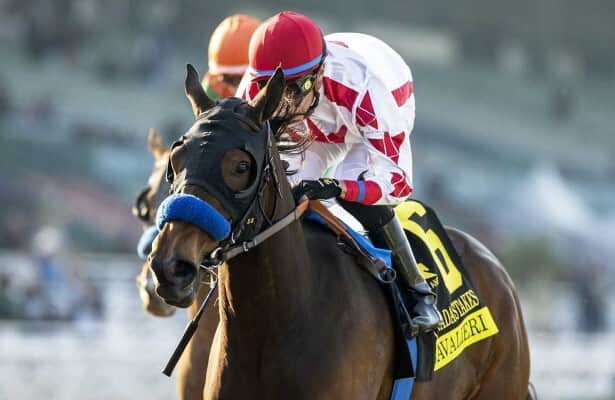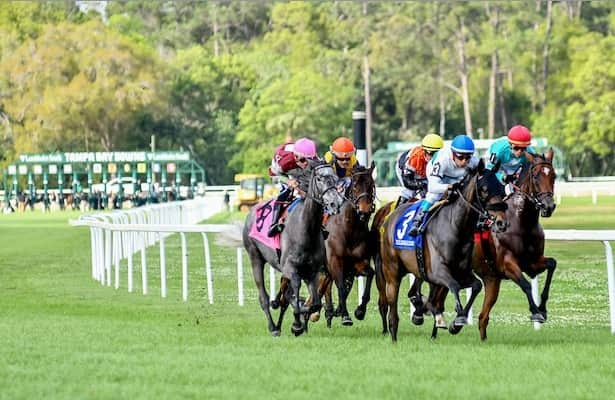CHEYENNE — Lawmakers forwarded bills Tuesday that, if passed, would grant city and town governments autonomy in approving historic horse racing machines within municipal limits, as well as allow Wyoming operators to broadcast local thoroughbred horse racing.
Legislative leadership directed the Joint Appropriations Committee in April to review the Wyoming Gaming Commission and the state’s billion-dollar gambling industry.
After new forms of gaming were legalized in the Equality State three years ago, the industry grew seemingly overnight, and state lawmakers are just now catching up.
Rep. Tom Walters, R-Casper, was asked to lead a working group this year studying where state regulation is needed to rein in certain types of betting such as historic horse racing machines. Walters previously told the Wyoming Tribune Eagle the spread of gambling machines taking over local bars was a top concern among his constituents.
People are also reading…
Of the seven bill drafts related to gambling considered by members of the JAC on Tuesday, three were forwarded by the committee to be considered by the governing body in the 2025 general session.
Lawmakers voted down two bills that would have capped the number of HHR machines permitted in the state, largely over concerns of restricting a free market.
Local approval of historic horse racing
One of these bills, “Local approval for simulcasting,” would give town and city governments authority to approve or deny simulcasting permits for HHR machines — a power currently reserved for county commissioners.
The bill is a revised version of a draft that was proposed to the committee by Wyoming County Commissioners Association Executive Director Jerimiah Rieman in June. Rieman has previously argued that county commissioners should still reserve the final say in approving simulcasting permits in cities and towns.
The bill allows city and town governments to approve simulcasting permits within their jurisdiction but requires final approval by the county.
Any simulcasting permit application for locations outside of city limits would only need county approval, according to the bill’s originally drafted language. Rep. Clark Stith, R-Rock Springs, said he found this provision in the bill to be “asymmetrical.”
“If the machines are in a city, then you have to have the approval of both the city council and the county commissioners. But if these machines are located in the unincorporated areas of the county outside the city limits, then you just need the county commission,” Stith said. “The city has no say. That’s just weird.”
Legislative counsel Tamara Rivale said the language reflected a compromise between the two entities “so that they would have an appropriate say.”
Walters added that leaving out counties, an entity that has been charged with approving HHR permits for the last decade, would be a “major change.”
Cheyenne City Councilman Mark Rinne told legislators that the only gaming sites the city is concerned with are ones within city limits, because “it does have an impact on our neighborhoods.”
Corporate gaming sites located miles outside the city have little to no impact, Rinne said.
“We really don’t care what happens down there, because it’s not very likely it’s going to be part of the city,” Rinne said. “And that was the reason for the asymmetry.”
Rieman said other responsibilities, such as law enforcement, prosecution and mental health services related to gambling, still fall on the county.
“We are (continuing our) interest there,” Rieman said. “And I would also say, if you look at the liquor license laws, there is some symmetry there. We have limitations within five miles of a municipality for liquor licenses. So it’s not just limited to this particular approach.”
The bill was forwarded by the committee to the 2025 general session.
National horse betting
The Horseracing Integrity and Safety Act was passed by Congress in 2020 and implemented “a horse racing anti-doping and medication control program and a racetrack safety program.”
Bill draft 232, “Interstate export of Wyoming horseracing,” would allow Wyoming thoroughbred horse races, which are currently only regulated by the Wyoming Gaming Commission, to become HISA compliant and allow national betting.
The bill also creates a 6% tax on net proceeds, which would go into the state’s general fund.
“Tracks (around the country) are closing, and so Wyoming’s horse racing industry is growing,” Walters said. “That’s where we can grow the state, the activity, outside of our borders.”
Walters clarified that the 6% tax is separate from the 1% that’s already placed on pari-mutuel wagering. It would be placed on revenue streams from interstate wagering, he said.
There are currently three pending lawsuits before the U.S. Supreme Court that challenge the constitutionality of HISA, largely over the federal fee structure. One article published in Thoroughbred Daily News reported it is “unlikely” the federal court will decide whether it hears any of the cases before the end of the year.
Wyoming Downs spokesperson Neal Tomlinson told committee members his organization was against the bill “because of the unsettled nature of the litigation.”
He added that it would cost Wyoming Downs nearly $1 million in total fees in order to be compliant with HISA.
“We just think that it’s kind of premature to try to move this legislation forward without knowing what’s going to happen,” Tomlinson said.
Wyoming Gaming Commission Deputy Director Nick Larramendy said it cost roughly $160,000 for four operational Wyoming tracks, at a price tag of roughly $40,000 per track, to be HISA compliant.
“A lot of the litigation being had is over the fee structure and how drastic of changes it is between tracks,” Larramendy said. “I know there’s some talk now of moving it to set fees, but that hasn’t happened yet.”
This bill also passed the committee and will be filed for the 2025 general session, which starts Jan. 14.












